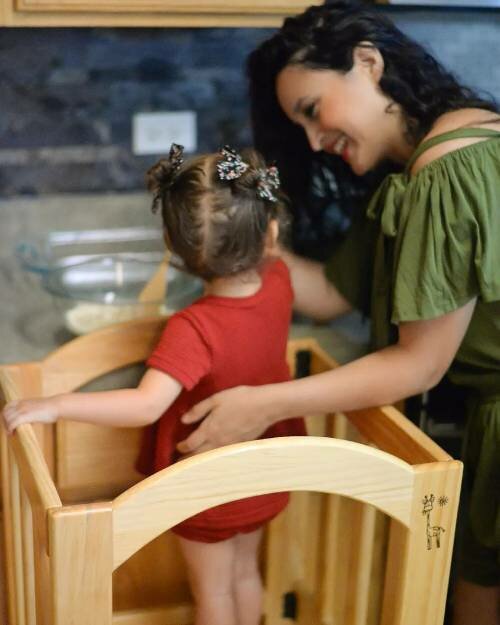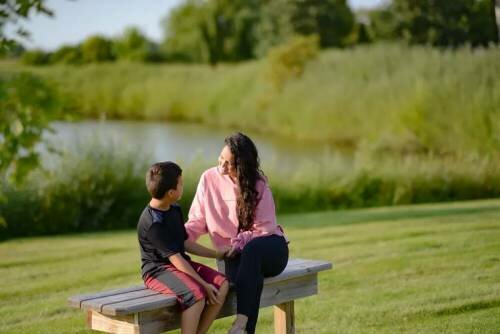It is not uncommon to see our children shy away from dealing with people or prefer to be alone. Some parents may call it shyness, while others can be concerned about their child’s mental health. However, it is your responsibility as a parent to build your child’s self-esteem and make them self-confident. A child’s self-esteem is influenced by two things, nature, and nurture. Your child’s biological strengths and weaknesses influence their developing self-esteem (nature). More importantly, their interactions with their family and the surrounding environment affect their self-esteem as well (nurture). That said, we talked with the parenting coach, Dr. Shaimaa Ali, about children’s self-esteem, when they develop it, and how to build their self-confidence, so keep reading this interview to understand more.

Image credit: @mamadefour
1- Many moms wonder whether or not kids develop self-confidence like adults. At what age does a child develop self-esteem?
Yes, kids do develop self-confidence at a very young age. Children can develop self-confidence as early as a few months old when their mom gives them the simplest of tasks like eating on their own or anything else according to their age.
What Is Emotional Shopping? And How to Control It?
2- What causes low self-esteem in a child?
How a child perceives themselves is exactly how their parents see them. So, when a mom always criticizes her child, they will always find themselves lacking in self-confidence. The best thing a parent can do is trust and show their child that they trust them to finish a specific task or do something as long as it’s not dangerous.
3- As a mom, how do I know that my child lacks self-confidence?
When your kid is showing signs of not talking to others, refusing to shake hands, saying "hi," or being frightened most of the time, they probably lack self confidence. Moreover, when your child has no friendships, their school will probably report this to you, which is another sign of lacking confidence.
On Mother’s Day: Yasmine Marakby Tells Us More About The Life of a Blogging Mom
4- Do all shy kids lack self-confidence?
No, shyness is different from lacking confidence. A shy kid is more likely to be an introverted child who likes to spend time alone, which is something that can be acquired from their parents’ lifestyle. If the parents are shy, don’t go out much, or don’t have many friends, their kid may become shy as well. But this should not be mistaken for a lack of confidence.
5- How can parents build their child’s self-confidence?
The more parents consider their child a responsible member of their family, the more they will become confident. Parents should always assign tasks to their children, such as cleaning up their toys before bedtime, doing their homework, playing sports, or practicing their favorite hobbies.

Image credit: @mamadefour
6- What are the consequences of low self-esteem in a child? How far can it affect their life?
Unfortunately, lack of confidence can affect the child’s life to such an extent that they may never be able to make friends or be successful at school. If the child lacks confidence, they won’t take initiatives to talk to others or ask questions at school when they don’t understand something, which will hinder their success and make them way behind in school.
18 Movies That Gen-Z Will Love And Relate to!
7- What about social media platforms? Do they play a part in affecting children’s self-confidence? And how to deal with this problem?
The problem with social media, TV, PlayStation, or screens, in general, is that they're considered one-way communication, which makes it difficult for a child to create interactions. As a result, the child can’t start a conversation or show normal reactions, which makes them always have bad tempers or become impulsive.
8- When is it mandatory for a mom to see a child psychiatrist?
Whenever a mom witnesses that something is off about her child that doesn’t fall within the normal scale or whenever someone gives her comments about her child, she must pay close attention to them and their behavior. It is best not to ignore these signs even if they were minor. A parent should consult a child psychologist or specialist who can judge if their child has a problem or not. A specialist will pinpoint the problem to help their kid become better.
9- Finally, share useful advice for parents, moms specifically.
All parents should know that every stage of their child’s age is different and requires different methods of handling. So, it is important to learn more about their child’s age, their needs, and how to handle them in the best way possible. Children of different ages should not be treated the same. Finally, motherhood is instinctive, but raising children the right way requires lots of reading and education for the parents to be able to raise their child correctly.
Main image credit: @shaimaaali_parentingcoach & @mamadefour

















